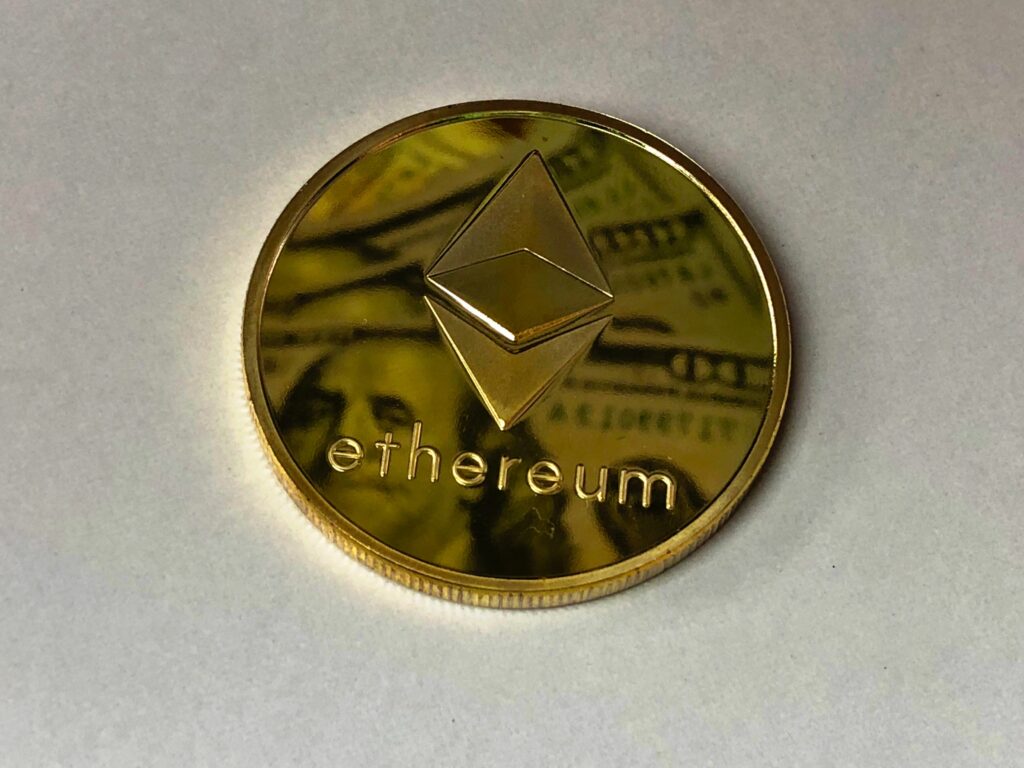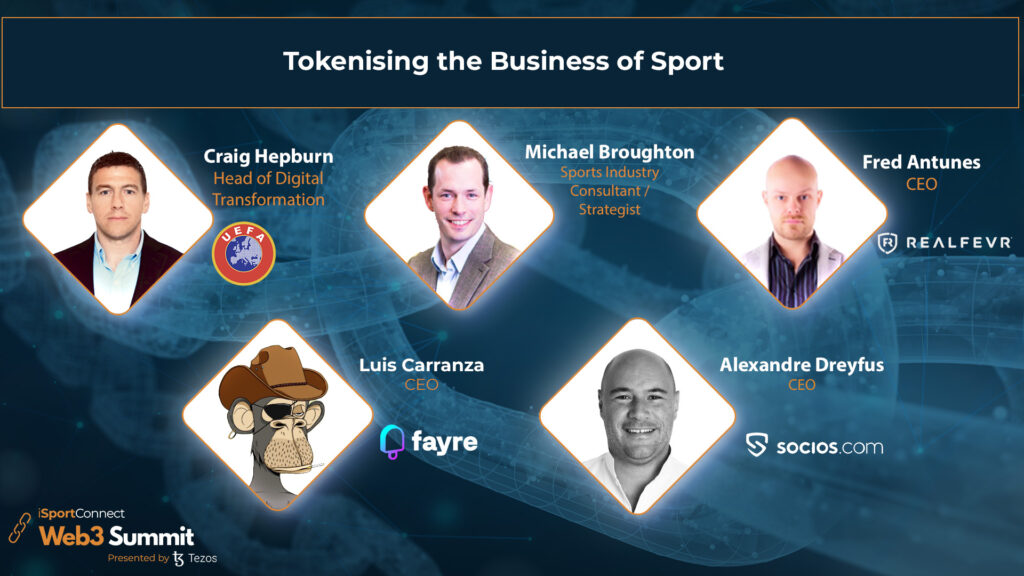The Backlash
June 2, 2022
Michael Broughton provides an overview of how blockchain is impacting the world of sport.
The market plummeted for three straight days. There was a mass sell off and indeed the market lost over $1.5 trillion in just those three days. Some lost over $200bn valuation just on their own. The losses were staggering.
Overall, this year the market has lost $7trillion… and all of it is regulated, blue chip stocks! That’s the S&P 500 in the USA. So that incredible figure doesn’t include value lost on other stock markets so far this year. Some of the aforementioned companies included Apple and Tesla.
It’s important to remind everyone of this because in recent weeks it has been popular to bash the ‘crypto crash’ on the basis that these are unregulated currencies. There is no doubt the rout in the crypto currency world has been painful but to kid ourselves it’s because of the unregulated nature of that market is misguided at best and hypocrisy at worst.

Personally, I do not trade in crypto. I don’t own bitcoin or Ethereum or any other currencies and yet I am a fan of blockchain. Indeed, I first started writing about it on LinkedIn back in 2017. The article ‘Build Sport Block by Block’ was read by less that 100 people at the time. My focus then and now continues to be on the provision of value. As I work in the sports and entertainment industry that revolves around the consumer and fan experience.
I’m not a currency trader. If I was I would either be working in an investment bank or sitting in front of a row of screens figuring out what to buy and sell. That’s not my skill set so I don’t trade fiat currencies and I don’t trade crypto. Here’s the catch – whilst one is regulated, and the other isn’t you can make or lose money on both. At least in the crypto world you can go back and see who you lost to as its all recorded and visible if you care to look.
“The change that blockchain enables is inherently scary for many and hard to understand. That tends to lead to a backlash before it can become more generally accepted.”
This is not to lessen the impact of the crypto crash. It has tarnished the industry and brought financial pain to many. The hope must be that with the bubble bursting the whole industry will take another look at itself and rebuild to provide greater utility above and beyond the speculation that has driven the crypto currency marketplace.
Yet much like some said the 2001 crash and the bursting of the dot.com bubble was the end of the internet so we will see detractors of the blockchain world attack. The change that blockchain enables is inherently scary for many and hard to understand. That tends to lead to a backlash before it can become more generally accepted.
The Punch and Judy Show
Sport and Crypto is like going to the English seaside and seeing a classic puppet show. The bat being swung at the head of everyone who dares to play the game. As a self-professed evangelist of the opportunities that the blockchain represents I caution against the rapid lurching to conclusions before we have even passed Go.
At the same time, I fully encourage others to learn as much as they can about the emerging technology, how it works, the pros and cons. Equally, as not everything should be on the blockchain, its emergence should not detract you from getting the basics right – from content to data strategies and beyond.
However, there are two forms of blockchain monetisation going on in today’s industry and they follow well-worn paths.
Selling Sponsorship
Sponsorship is perhaps the most visible because you see the eye-popping figures when they are announced. From Crypto.com and FTX Arenas to WhaleFin about to be confirmed on the shirt sleeve of Chelsea. These are mega-deals, and they drive an awful of attention and awareness.
Which is exactly the point.
Estimates at the end of 2021 showed that 3.9% of the planet, roughly 300m people own a crypto wallet. Can you name a better more visible route to market than sports sponsorship? So, there should be zero surprise from anyone that the main exchanges and currencies are throwing money at sports to establish a brand and to have the early masses begin to open accounts on their platform.

This is a well-trodden path and sport is doing what it has always done and milked the industry that is trying to get attention for sponsorship dollars. This has happened across a host of industries – from tobacco and alcohol to gambling and let’s not forget the pre 2008 crash surge of financial services sponsorship.
The advice I would give to any sports property is that before they enter into sponsorship agreement with a new partner – regardless of if they are a crypto related business or not – is do your due diligence. Makes sure you trust your counter party and that your fan base, both those that attend and those that engage beyond the venue, will appreciate the relationship.
In the USA you have seen in the past few years, particularly with FanDuel and DraftKings, the proliferation of betting sponsorship and commercial agreements, and a general acceptance that gambling will offer the next level of fan engagement. This has always felt slightly odd given the entire gambling industry is predicated on the philosophy that the ‘house always wins’. Which begs the question, what about the Fan?
The Fan
Where I get excited around blockchain is beyond the sponsorship opportunity. Its where we begin to see opportunities around the interaction with the fan.
Web2 was fabulous at demonstrating the distribution capabilities of sport, the engagement of our diverse fanbases and the fact that they want the rich content we can provide with a seemingly insatiable appetite. Whilst the form and forma may be changing the interest has not waned.
“The emergence of DAO’s is another intriguing opportunity that whilst also unregulated today may lead to a long-term change in the ownership structures of the future.”
It also demonstrated that they want to be more involved with the teams and athletes they idolise.
BUT, the failing of Web2 was that the value chain was broken. Sport has not been able to generate the revenue that their content deserves. The walled gardens of the FANGS have done brilliantly off the back of it. Building audiences and income streams off the back of the fans love of sport and the innumerable content houses sport has created.
We as an industry have fed the beast willingly and are now having to figure out how to disrupt ourselves.
The tokenisation of the relationship with the fan is a key way to build on the bedrock of our content and distribution and to capture more of the value chain where it matters most – with those that own the IP. That may be an athlete, a team, a league, or a nation and will also soon include the Fans themselves.
It will come in the form of ticketing, marketing, content, engagement and also athlete data to name but a few. The emergence of DAO’s is another intriguing opportunity that whilst also unregulated today may lead to a long-term change in the ownership structures of the future.
This is not a utopia we are talking about but the next step in the evolution of the role of fans. In the 1990’s you were lucky to have clean toilets in stadiums, in the 2000’s we began to engage with fans, in the 2010’s the more enlightened realised the fans were now the content producers and in the 2020’s we may end up with “Earn as you Fan”, flipping the economics on their head.
For now, we are experimenting, and it leaves me excited. There are several players who have taken the blockchain and begun building the eco-systems that they are envisioning for the future. Amongst them are a few that lead the way.
One of our key challenges has been that beyond the stadium, we have found it incredible hard as an industry to build models that reward the fans. It’s relatively easy to provide value to those that attend events but the vast majority don’t. the loyalty systems in place today fall short of what is needed, and as such both new tech and new thinking is needed.

Socios has been building a network of teams and fans that is almost unparalleled in the industry. At last count they had 1.5m+ users and agreements in place with over 150 rights holders. The concept of the fan token didn’t exist before them and we are perhaps seeing the emergence of entirely new loyalty and reward system that was previously unthinkable. Man City recently spoke to the fact that less than 1% of their fan base ever comes to their stadium, but the reality is that until blockchain and utilities like Socios came about there was no way to create that direct connection – nor a way to monetise unless you meant sending the fan to Zuckerberg.
It is going to be interesting to see what a digital and crypto company like Socios does next. Now they have the audience they need to deliver value. What we have seen to date has been an evolution on polls, rewards and benefits linked to partner sponsors and other commercial entities. I suspect that will continue to evolve as they learn what fans want rather than simply provide what we did on Web2 in Web3 environment. What has been interesting is to see that fans away from the venues themselves appear to be embracing the solution.
As the father of an 11-year-old boy who has spent a fortune on EPL and UCL Topps Cards and is expecting another ‘investment’ into the 2022 FIFA World Cup Panini collection I am also taken by what others have done in the NFT space, bringing the trading card into the 21st century.
Sorare and RealFevr are exciting companies, along with the Dapper Labs of this world. Reimagining what it means to own digital cards and how to not only collect but play game alongside the provision of inbuilt marketplaces for your fans is revolutionising of a somewhat archaic business. None of these platforms are perfect yet. They have barely begun to exist to be fair to them, but their growth and the data that powers them will lead to evolution and improvements.
It’s important to look at these companies and any new emergent through a new lens. How can they take fan engagement to the next level – what I refer to as involvement, making it a two-way relationship?
The old trading card model still exists and has relevance today. Indeed during the lockdowns, the trading card business boomed. It should be no surprise therefore that the NFT versions, effectively digital representation of the classic model, have thrived as well. The economic model is also better for the rightsholders, and the ability to trade makes it more amenable to fans.
It’s INEVITABLE
Back to the beginning. Regulation hasn’t stopped the stock market from crashing and wiping out a vast among of inherent value. The crypto crash though will likely precipitate the need for regulation in the industry.
It’s not as simple as some make it out to be as what Central Banks and Governments are trying to figure out is how to protect the power mechanics of the current way of doing things yet take on the better elements of how cryptocurrencies operate. We are talking about the underpinning of the Global Financial System so there are a lot of dynamics to navigate.

As with all innovation and the emergence of new technologies, the rules and regulations we put in place to protect the status quo led to innovation in other areas and spawn new markets. That now needs to be managed sensibly without killing off the new opportunities that like ahead.
Cryptocurrencies are here to stay. More will emerge and we will get better at tackling some of the issues – such as reducing the energy needed to run them. The use cases will expand and the ability to create value for all parties will increase.
“Regulation is also inevitable. The better companies in this space have already been calling for it, recognising that it’s needed and a sincere route towards broader market acceptability.”
Regulation is also inevitable. The better companies in this space have already been calling for it, recognising that it’s needed and a sincere route towards broader market acceptability and growing the overall market.
The Crypto sponsorship market will, in time, fade to some extent. This is the gold rush at the beginning that happens every time a new market emerges and needs sport to get public awareness and acceptance.
Rather than fighting crypto and wishing that the old world will prevail the industry should come together and forge a new path where the fan is at the centre of the marketplace, and we can use the magic of blockchain to uncork the true value of sport via those that are most important.
We must as an industry remain vigilant. Equally we should push that new blockchain companies to put our fans at the heart of their thinking and pay more than lip service to the ‘utility’ of the chain. This is a ground-breaking moment for out industry and the promised that we saw with the emergence of the internet may finally spawn the rewards that we have long hoped for.
You can find Michael on LinkedIn here – https://www.linkedin.com/in/michaelcbroughton/
Want to hear more from Michael? He will be moderating a great panel on ‘Tokenising the Business of Sport’ at the web3summit.sport on Jun 28/29 at the Emirates.
Find out more about the Summit here – https://www.web3summit.sport/



